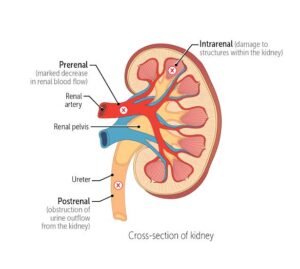To know the basics of kidney disease kindly read through the link : KIDNEY DISEASE
ACUTE KIDNEY INJURY�
Acute kidney injury is formerly known as Acute Renal Failure (ARE).�It occurs over hours or days i.e it occurs over a short period of time. With prompt treatment, acute kidney injury is often reversible although the mortality rate are hight ranging from 40-70% in severe cases. Most cases of acute kidney injury develop in the hospital occurring in about 20% of hospitalized patients.
There are many disorders that can lead to acute kidney injury and these causes are classified into three; they are Prerenal, Intrarenal and Post renal. The pre renal factors occurs in 60-79% of the cases of AKI. They are conditions that causes severe reduction in blood flow to the kidney. Examples are heart failure, shock or substantial blood loss. The intrarenal factor are those that damage the kidney tissues e.g infections, intoxicants, drugs etc. While the post renal factors are those that prevent urine excretion due to urinary tract obstruction.
AKI can be classified into two categories which are the ; Risk,injury, failure, lost, end stage kidney/renal disorder (RIFLE) and Acute kidney injury network (AKIN).

Consequences of AKI
A decline in the function of the kidney alters the composition of blood and urine and then the kidney finds it difficult to regulate the level of electrolyte, acid and nitrogenous waste in the blood. Acute kidney injury is typically identified when the reduced urine output is coupled with a progressive serum creatinine level.
For the treatment of AKI it is also similar to that of chronic kidney disease which you can find here : CHRONIC KIDNEY DISEASE
Renal patients are advised to avoid vegetables and fruits high in potassium, also eating out should not be encouraged, salt in cooking should be limited. The protein intake should be quantified depending on the degree of the impairment in the function of the kidney.






Leave a Reply